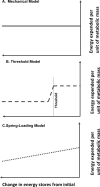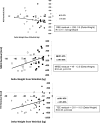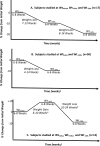Models of energy homeostasis in response to maintenance of reduced body weight
- PMID: 27460711
- PMCID: PMC4965234
- DOI: 10.1002/oby.21559
Models of energy homeostasis in response to maintenance of reduced body weight
Abstract
Objective: To test three proposed models for adaptive thermogenesis in compartments of energy expenditure following different degrees of weight loss. Specifically, (1) there is no adaptive thermogenesis [constant relationship of energy expenditure (EE) to metabolic mass]. (2) There is a fixed degree of adaptive thermogenesis once fat stores are below a "threshold." (3) The degree of adaptive thermogenesis is proportional to weight loss.
Methods: The relationship between weight loss and EE was examined in 17 inpatient subjects with stable weight and obesity studied at usual weight and again following a 10% and a 20% weight loss.
Results: Following initial weight loss (10%), resting (REE) and non-resting (NREE) EE were significantly below those predicted on the basis of the amount and composition of weight lost. Further reductions below predicted values of NREE but not REE occurred following an additional 10% weight loss. Changes in body weight, composition, and/or energy stores were significantly correlated with changes in EE.
Conclusions: All models are applicable to the decline in EE following weight loss. The disproportionate decline in REE is consistent with a threshold model (no change with further weight loss) while the disproportionate decline in NREE is largely reflective of the degree of weight loss.
© 2016 The Obesity Society.
Figures






Comment in
-
Adaptive thermogenesis: Do we need new thinking?Obesity (Silver Spring). 2016 Aug;24(8):1610-1. doi: 10.1002/oby.21556. Obesity (Silver Spring). 2016. PMID: 27460710 No abstract available.
Similar articles
-
Long-term persistence of adaptive thermogenesis in subjects who have maintained a reduced body weight.Am J Clin Nutr. 2008 Oct;88(4):906-12. doi: 10.1093/ajcn/88.4.906. Am J Clin Nutr. 2008. PMID: 18842775
-
Changes in Energy Expenditure with Weight Gain and Weight Loss in Humans.Curr Obes Rep. 2016 Dec;5(4):413-423. doi: 10.1007/s13679-016-0237-4. Curr Obes Rep. 2016. PMID: 27739007 Free PMC article. Review.
-
Evidence for the existence of adaptive thermogenesis during weight loss.Br J Nutr. 2001 Jun;85(6):715-23. doi: 10.1079/bjn2001348. Br J Nutr. 2001. PMID: 11430776 Clinical Trial.
-
Imposed rate and extent of weight loss in obese men and adaptive changes in resting and total energy expenditure.Metabolism. 2015 Aug;64(8):896-904. doi: 10.1016/j.metabol.2015.03.011. Epub 2015 Apr 8. Metabolism. 2015. PMID: 25908563
-
[Energy expenditure. How can they be measured?].Rev Prat. 2009 Jan 20;59(1):41-7. Rev Prat. 2009. PMID: 19253879 Review. French.
Cited by
-
Obesity-induced and weight-loss-induced physiological factors affecting weight regain.Nat Rev Endocrinol. 2023 Nov;19(11):655-670. doi: 10.1038/s41574-023-00887-4. Epub 2023 Sep 11. Nat Rev Endocrinol. 2023. PMID: 37696920 Review.
-
Motivation States for Physical Activity and Sedentary Behavior: Desire, Urge, Wanting, and Craving.Front Psychol. 2020 Nov 6;11:568390. doi: 10.3389/fpsyg.2020.568390. eCollection 2020. Front Psychol. 2020. PMID: 33240154 Free PMC article. Review.
-
Effect of Over- and Underfeeding on Body Composition and Related Metabolic Functions in Humans.Curr Diab Rep. 2019 Nov 4;19(11):108. doi: 10.1007/s11892-019-1221-7. Curr Diab Rep. 2019. PMID: 31686224 Review.
-
A randomized study of dietary composition during weight-loss maintenance: Rationale, study design, intervention, and assessment.Contemp Clin Trials. 2018 Feb;65:76-86. doi: 10.1016/j.cct.2017.12.004. Epub 2017 Dec 9. Contemp Clin Trials. 2018. PMID: 29233719 Free PMC article.
-
Finding balance: understanding the energetics of time-restricted feeding in mice.Obesity (Silver Spring). 2023 Feb;31 Suppl 1(Suppl 1):22-39. doi: 10.1002/oby.23607. Epub 2022 Dec 13. Obesity (Silver Spring). 2023. PMID: 36513496 Free PMC article. Review.
References
-
- Lewis C, Jacobs D, McCreath H, Kiefe C, Schreiner P, Smith D, Williams O. Weight gain continues in the 1990s: 10-year trends in weight and overweight from the cardia study. Coronary artery risk development in young adults. Am J Epidemiol. 2000;151:1172–1181. - PubMed
-
- Du H, A Dvd, Ginder V, Jebb S, Forouhi N, Wareham N, Halkjaer T, Tjonneland A, Overvad K, Jakobsen M, Buijsse B, Steffen A, Palli D, Masala G, Saris W, Sorensen T, Feskens E. Dietary energy density in relation to subsequent changes of weight and waist circumference in european men and women. PLoS One. 2009;4:e5339. - PMC - PubMed
-
- Forouhi N, Sharp S, Du H, A Dvd, Halkjaer J, Schultze M, Tjonneland A, Overvad K, Jakobsen M, Boeing H, Buijsse B, Palli D, Masala G, Feskins E, Sorensen T, Wareham N. Dietary fat intake and subsequent weight change in adults: Results from the european prospective investigation in cancer and nutrition cohorts. Amer J Clin Nutr. 2009;90:1632–1641. - PubMed
-
- Pietrobelli A, Allison D, Heshka S, Heo M, Wang Z, Berktay A, Laferrere B, Rosenbaum M, Aloia J, Pi-Sunyer F, Heymsfield S. Sexual dimorphism in energy content of weight change. Int J Obes Relat Metab Disord. 2002;26:1339–1348. - PubMed
-
- Leibel R, Rosenbaum M. Metabolic response to weight perturbation. In: Clément K, editor. Novel insights into adipose cell functions, research and perspectives in endocrine interactions. Heidelberg: Springer-Verlag; 2010. pp. 121–133.
MeSH terms
Grants and funding
LinkOut - more resources
Full Text Sources
Other Literature Sources
Medical

